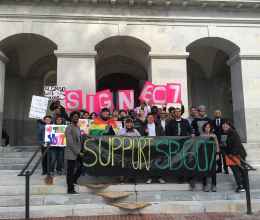SAN DIEGO – For years, critically important questions have persisted about the way school district leaders plan and budget services for their most vulnerable, high-need students. California school districts are in the fifth annual cycle of the Local Control Funding Formula, the school funding law that reformed our state’s K-12 education finance and governance system.
What we’ve seen so far is raising serious concerns among parents, students, educators and advocates for education equity. These concerns include a lack of meaningful public engagement, a troubling lack of transparency and unanswered questions about use of funds.
Under the state’s funding formula, school districts receive additional funding - “supplemental and concentration” funds calculated by the number of high-need (defined in the education code as “low-income, English learner and foster youth”) students enrolled. While these monies must be used to improve educational outcomes for high-need students, every district has discretion in how to allocate its own funding.
In exchange for this flexibility, the law requires transparency and community engagement. Each year, district leaders must collaborate with parents, students and community members to develop a Local Control and Accountability Plan (LCAP). This plan is supposed to show how a district will use its funding to improve student performance based on specific metrics.
Last year, we explained that many district LCAPs across California failed to reflect lawful expenditures. We heard from community organizations, including the Association of African American Educators, that this is true of the plans put forth by San Diego Unified School District – the second largest district in our state. Earlier this month, the ACLU Foundation of San Diego & Imperial Counties sent a letter to San Diego Unified outlining concerns regarding its LCAP practices and proposed expenditures.
For example, San Diego Unified gave parents and stakeholders only one week to review the full draft LCAP – a document of more than 300 pages – significantly restricting their ability and their right to provide meaningful feedback on the critical decisions impacting their students. The district’s own parent advisory council reported that parents were not given enough time to provide informed feedback. The district also failed to provide written responses to parents’ questions and concerns in a timely manner. This lack of meaningful public engagement may violate the law, but more importantly, it violates public trust. Every parent, especially parents of students in need, deserves to be heard and considered.
Another significant concern is the district’s use of supplemental and concentration funds earmarked for low-income, English learner and foster youth students. San Diego Unified spends most of these funds on district-wide programs and services without adequately explaining how these programs and services will help high-need students meet educational goals.
It is critically important that the limited funds generated by high-need student enrollment is in fact invested in ensuring they have the same opportunities to succeed as any other student. San Diego Unified must not use their supplemental and concentration funds simply to cover budget gaps and shortfalls.
Year after year, parents and community members report that San Diego Unified is not transparent about LCAP outcomes, actions and accounting. While the funding law permits flexibility, the nature and intent of expenditures must be clear. The district’s LCAP suggests that approximately $3.5 million earmarked for San Diego’s high-need students were not spent as planned in 2017. However, the plan fails to indicate why or how the funds were reallocated or whether the public had an opportunity to weigh in on any changes.
San Diego Unified often describes its plans and proposed actions too broadly and too vaguely to be clearly understood. And it frequently leaves out required information, such as which schools, grade levels and student groups will benefit. This diminishes the LCAP’s utility as a tool for accountability.
The public should not be forced to plead for transparency and accountability. California’s school districts strive to teach our children to think critically, meet deadlines, correct errors, follow the rules and surpass expectations. They should hold themselves to the same performance standards.
In San Diego, parents and students depend on district leaders to carry out the promise of education equity. San Diego Unified has an opportunity to set a high state standard for adhering to the funding law. By being truly transparent, accountable and equitable, the district will build the much needed trust with parents and local communities and bring an end to serious questions and concerns surrounding the LCAP.
Melissa Deleon is the equity staff attorney for the ACLU Foundation of San Diego & Imperial Counties.
San Diego Unified Must Be Truly Transparent, Accountable and Equitable in Funding Services for High-Need Students
Related Issues
Related content
Advocacy
August 5, 2020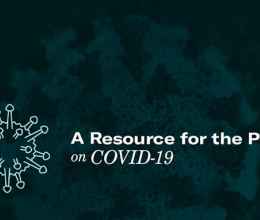
ACLU-CA Response to School District Closures
March 13, 2020Sigma Beta Xi v. County of Riverside (Youth Probation)
September 10, 2019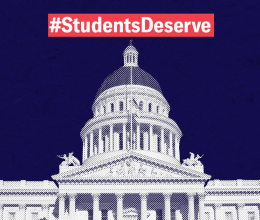
ACLU Applauds Governor’s Proposal to Expand Early Education, Calls...
January 10, 2019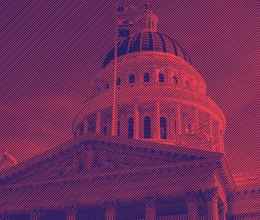
Justice Never Sleeps… and Neither Do We (Kind of)
October 3, 2018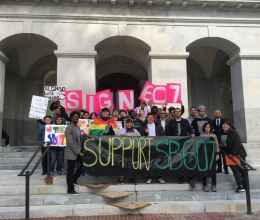
Keep Kids in School Act (SB 607)
October 1, 2018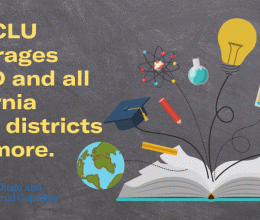
Why Informed Parent and Student Voices Are Needed For LCAP Development
September 13, 2018Time to end ‘willful defiance’ expulsions, suspensions in K-12...
August 20, 2018